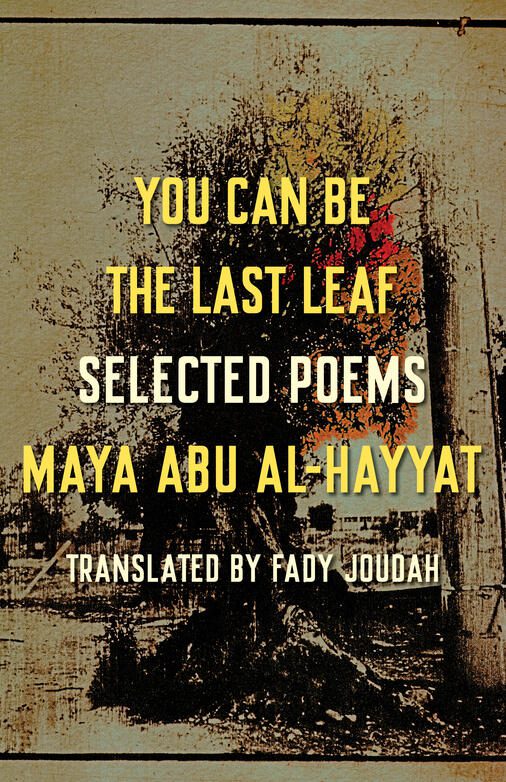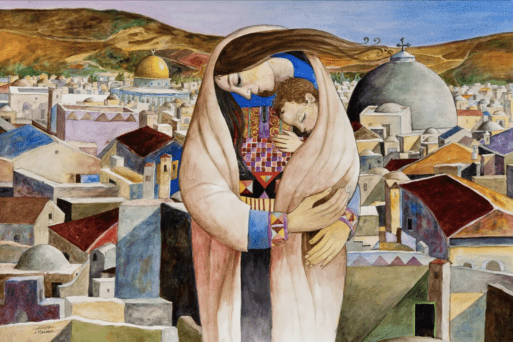
You Can Be the Last Leaf: Selected Poems
by Maya Abu Al-Hayyat (2022)
“You Can Be the Last Leaf” is a 2022 collection of poems by Palestinian novelist and poet Maya Abu Al-Hayyat. Her poem “Mahmoud,” relayed in full below, is told from the perspective of a would-be mother, imagining a son whom she grieves and yearns for, as she envisions an imperfect but tender family life they might share.
The poem is specifically addressed to her partner, the father of her child. It has a wistful tone as she imagines the mundanities of their life together, from cribs to school to first crushes, including the inevitable family quarrels along the way.
Mahmoud could have been our son.
I’d have objected to the name
and, for family reasons, you’d have insisted on it.
We could have bought him a crib with a blue quilt
and hung spinning musical animals
to coax him to sleep,
could have stayed up all night for his first tooth,
experimenting with various formulas
because my breasts couldn’t produce enough milk
for his voracious appetite.
And with a new Nikon camera,
we could have captured his first step.
And his verbal skills would have wiped the floor
with your niece’s skills, of course.
We could have disagreed over his elementary school:
nothing wrong with public education, you’d have said,
and I’d have demanded a private one.
You’d have turned your face toward me
as you counted our few remaining dollars
to my wailing about balancing the budget.
We would have been happy,
his first school bag in one hand,
his other hand waving to the neighbor’s girl
before waving to us.
His teacher would’ve complained
as teachers are wont to do,
and we’d have called her names for her blindness
to the genius of our only son. Yes,
we would have bought him a battery-operated car,
built him a paper plane that doesn’t fly,
maintained his teeth white,
flipped his collar for coolness,
and he’d have loved me more than you
because of issues beyond my grasp:
your jealousy would’ve grown mysterious.
And when his voice changed he’d hate us both
and love the neighbor’s girl more.
Rumination would have haunted us
for hours at night. Our whispers
advising us to be patient, let go, observe
from a distance. Then you’d have lost your wits
over his first cigarette, the hidden pack
in the laundry room, but his tremulous voice
would prevent you from slapping him
with an open palm. You’d have forgiven him,
you’re kind like that. He’d only smoked in secret.
But the first rock he’d have thrown
at soldiers at the checkpoint,
to raise his heroic stock in Manal’s eyes,
would have declared war in our house:
biting followed by flying slippers.
Nightly debates wouldn’t have helped us
to core solutions. I’d have to carry him
between my teeth, fly him
from one neighborhood to another to shield him.
But he’d run away.
That would be who he’d always been.
A misguided kid who saps the heart and soul,
that’s who he was. Still you
were martyred eight years
before he was born, and he was martyred
eight years after you were gone.
The end of the poem reveals a devastating reality of so many would-be Palestinian families: in the face of decades of oppression, they will never get to live these family moments. In the case of “Mahmoud,” the man who would be his father was killed before they had the chance.
In this time of profound collective mourning, looking at the human stories is powerful. We are bombarded with sensationalist media headlines, but reflecting on the small, poetic moments that make up everyday family life reminds us of what is actually lost.

“Mother and Child” (2009) by Palestinian artist Sliman Mansour

 “Mahmoud” by Maya Abu Al-Hayyat
“Mahmoud” by Maya Abu Al-Hayyat


 Funeral Favors Offer Visitors a Tangible Memento
Funeral Favors Offer Visitors a Tangible Memento
 “Comeback” by Prince
“Comeback” by Prince
 “Other Side” Documents Woman’s Fight To Die As She Wishes
“Other Side” Documents Woman’s Fight To Die As She Wishes














